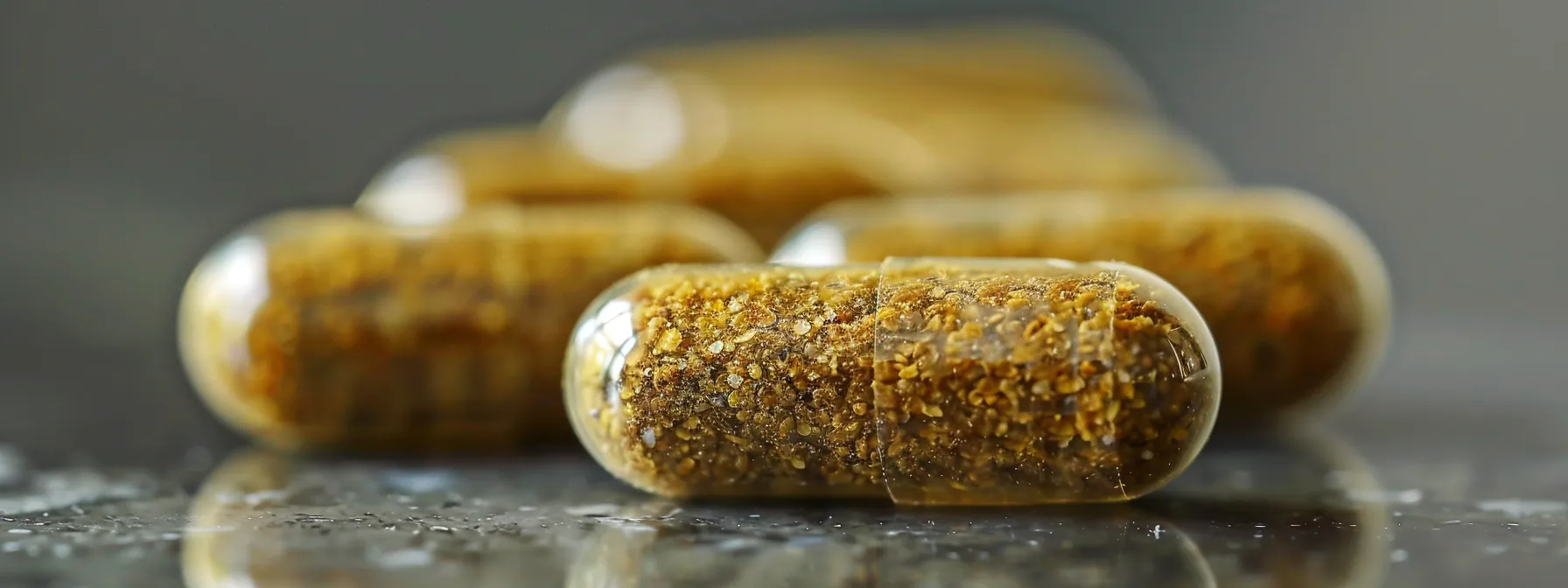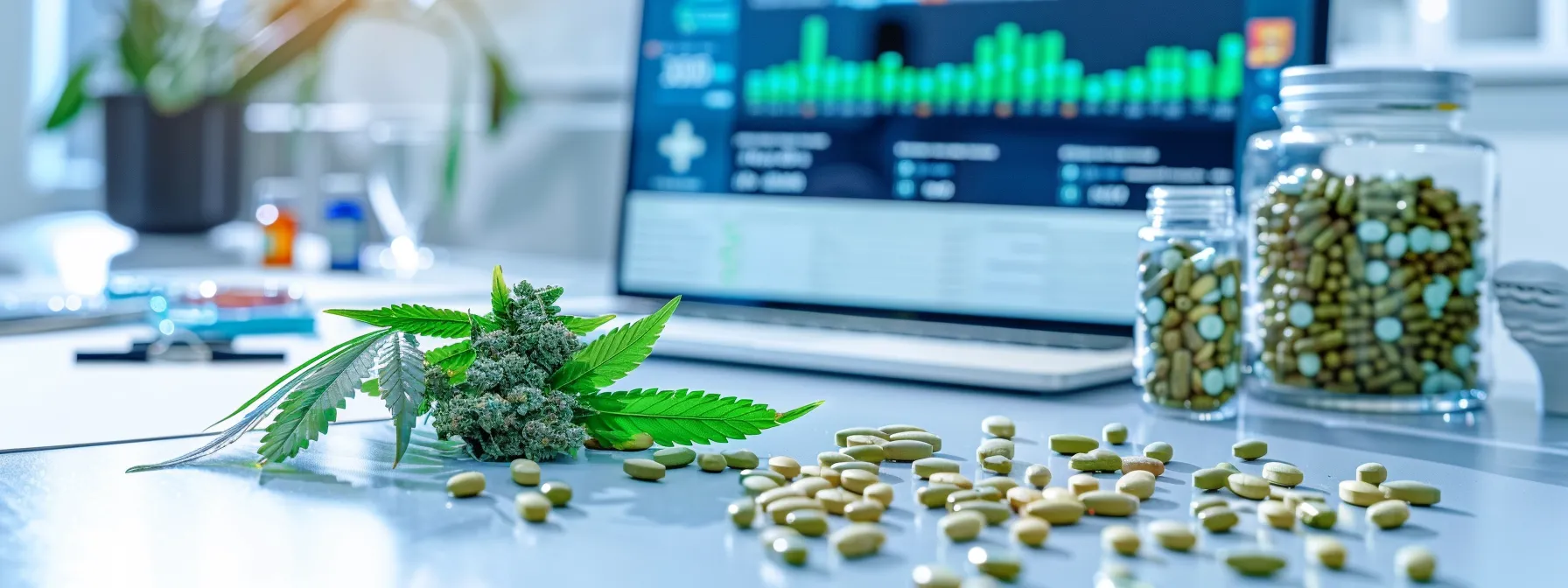THC Pills vs CBD Pills: Understanding the Key Differences presents clear facts about two popular cannabinoid options. The blog post explains the differences between THC and CBD capsules, examines their effects on sleep relief, and provides guidance to help readers choose the best option for their needs. This content offers practical insights for adult cannabis consumers who need clear information to make informed decisions. It addresses a common challenge of selecting between cannabis products while also clarifying legal details.
Key Takeaways
- THC pills interact with the body differently than CBD pills
- Each pill type offers specific dosage guidance and potential side effects
- Chemical compositions ensure potency and performance in capsule formulations
- User feedback and expert reviews inform safe cannabinoid usage
- Regulatory agencies monitor cannabinoid products for quality and consumer safety
Understanding THC Pills and CBD Pills

THC pills are designed to interact with the endocannabinoid system and may promote appetite stimulation in users, offering a different experience than other formulations.
THC products provide specific information regarding dosage and impact, and a physician can guide proper usage in controlled environments:
- Dosage recommendations
- Potential side effects
- Long-term use considerations
CBD pills focus on supporting relaxation and overall balance within the endocannabinoid system, presenting an alternative for individuals seeking mild effects without significant psychoactivity. For those looking for more intense experiences, the best THC pills are a suitable option.
Cannabis consumers can benefit from comparing THC and CBD pills based on factors such as appetite influence and physician advice, which assists in making well-informed decisions.
Key Differences Between THC and CBD Capsules

This section reviews the chemical composition of THC and CBD pills, how each substance affects the body, absorption rates linked to bioavailability, and a comparison of dosage formats. A systematic review of species-specific responses, contrasts with smoke alternatives, and even the dream of reliable alternatives provides practical insights for informed decisions.
Chemical Composition of THC and CBD
THC and CBD pills differ in their active ingredient concentration, where the ratio of cannabinoids is carefully formulated to achieve the desired potency and quality; this composition includes specific acids that transform during processing into active ingredients. For instance, manufacturers adjust the acid content to maintain a consistent active ingredient ratio to meet consumer expectations:
| Component | Description |
|---|---|
| Ratio | Determines the balance of cannabinoids in the product |
| Acid | Precursor forms that convert to active ingredients during processing |
| Potency | Reflects the effectiveness of the active ingredient concentration |
THC and CBD capsules maintain distinct chemical compositions that address different consumer needs; professionals ensure that the quality of each product is verified by monitoring the active ingredient ratio and acid conversion process, thus offering reliable potency and performance for users seeking clarity in their consumption experience.
How THC and CBD Affect the Body
THC pills often affect body perception by altering sensory input, while CBD pills work to stabilize neural and hormone activity, potentially reducing issues like seizure sensitivity. Here is an overview:
| Aspect | THC Pills | CBD Pills |
|---|---|---|
| Seizure | May exhibit indirect influence on neurological balance | Often used to help moderate seizure episodes |
| Perception | Affects sensory interpretation and awareness | Maintains a more neutral effect on sensory input |
| Hormone | Can initiate minor changes in hormone levels | Exerts a stabilizing effect on hormonal activity |
| Trichome | Quality influenced by trichome production on the plant | Focuses on rigorous extraction techniques minimizing trichome residue |
| Chocolate | Some innovative THC pills incorporate a chocolate base for taste | CBD formulations typically retain a neutral, non-edible base |
CBD pills promote relaxation with clear dosage guidance, while THC formulations may require extra caution to account for their effect on perception and hormone levels; professionals emphasize using proper guidance for safe consumption comparable to reviewing a trusted chocolate recipe. The impact on body response provides users actionable insights to better manage their intake based on firsthand expertise and user reviews.
Absorption and Bioavailability
THC and CBD capsules exhibit varied absorption rates tied to their unique chemical compound structures. Medical research indicates that the receptor interactions in the digestive system, paired with the influence of oxygen during processing, can affect both the potency and bioavailability, which may also relate to side effects such as diarrhea in sensitive users.
Expert reviews show that professional insights into receptor activation explain differences in absorption between these products. This analysis makes it clear that evaluating bioavailability assists users in selecting formulations tailored to their specific needs, ensuring each capsule delivers the intended clinical effects while minimizing unwanted reactions.
Comparison of Dosage Forms
The dosage form of THC pills, which include tetrahydrocannabinolic acid derivatives, often targets issues such as back pain by influencing dopamine levels to support pain relief. bestmarijuanaguide.com offers online comparisons that detail these benefits, helping users identify the ideal option for their needs.
In contrast, CBD capsules provide a more stabilized effect without significant changes in dopamine, making them a suitable alternative for those seeking comfort without psychoactive results. Clinical insights and user feedback on bestmarijuanaguide.com exemplify how the dosage forms in both products cater to individual conditions and preferences.
THC vs CBD for Sleep Relief

THC may improve sleep quality with unique effects, while CBD supports relaxation. User testimonials share experiences regarding recommended sleep dosages, mentioning products like butter-infused options and trusted brand alternatives. Reports also refer to benefits in contexts such as injury recovery, weight loss, and hash oil applications. The following sections offer practical insights based on real user feedback.
Effects of THC on Sleep Quality
THC's impact on sleep quality is influenced by its chemical structure, which works alongside compounds like myrcene to promote restorative rest. Experts note that individual genetics can alter how THC is metabolized, affecting sleep patterns and duration.
Studies indicate that a hybrid formulation combining natural compounds can help stabilize sleep cycles, allowing the consumer to benefit from a balanced effect on the eye and brain function:
| Factor | Impact on Sleep |
|---|---|
| Chemical Structure | Determines absorption and efficiency |
| Myrcene | Aids in relaxation and sleep initiation |
| Genetics | Influences individual response and effectiveness |
| Hybrid Formulation | Balances multiple active compounds for stable sleep patterns |
Effects of CBD on Sleep Quality
The impact of CBD on sleep quality is noted by experts and budtenders alike for its ability to support a calming experience without harsh side effects; users report fewer disruptions during the night and appreciate the balance achieved through controlled substance oversight. Clinical data shows that formulations with cannabinol components can provide consistent results, similar to how a well-baked cookie offers the right texture and taste.
Research indicates that precise dosing of CBD leads to improved sleep cycles, which some view as a practical solution in comparison to traditional treatments under the controlled substances act:
| Attribute | Description |
|---|---|
| Dosage Accuracy | Ensures effective sleep aid performance with minimal side effect |
| Calming Influence | Supports a soothing experience without psychoactive interference |
| User Feedback | Budtenders and consumers note improvements similar to the satisfaction of a perfect cookie |
Enhanced sleep quality and steady outcomes confirm that CBD pills provide valuable support for night-time routines.
User Experiences and Testimonials
User experiences show that THC pills are favored by some for their hypnotic qualities and noted benefits in pain management, although consumers remain cautious about the risk associated with dosage inconsistency. Reviews highlighted on platforms such as forbes emphasize that maintaining proper sleep hygiene is crucial when integrating THC into bedtime routines.
Testimonials indicate that individuals using CBD pills report a steadier sleep pattern and less interference with sleep hygiene, with many considering the product a practical support tool in managing pain. Clinical insights and expert feedback further detail the importance of following a reliable dosing regimen to minimize risk and improve overall sleep quality.
Recommended Dosages for Sleep
Reliable regulation plays a central role when experts analyze recommended dosages for sleep using THC and CBD pills. Clinicians often select an appropriate extract based on data from reputable sources, including World Health Organization reports, to guide proper intake for a balanced sleep pattern.
Medical professionals suggest that consumers use verified data and adhere to physician advice when comparing dosage recommendations. This approach helps users select optimal products that align with regulation standards and ensure that both THC and CBD extracts promote effective sleep management.
Choosing the Right Cannabinoid for Your Needs

This section outlines how to identify specific health goals and consider key factors when choosing between THC and CBD. The examination covers potential side effects affecting the gastrointestinal tract, nervous system, and includes insights on analgesic and antidepressant benefits, along with examples like pineapple express. It also stresses the importance of personalized treatment plans to meet individual needs.
Identifying Your Specific Health Goals
Professionals advise that consumers clearly identify their specific health goals before selecting a cannabinoid, ensuring that factors such as blood circulation and overall wellness are evaluated. They recommend viewing each intake experiment as a unique seed for insight, guiding individuals with conditions like rheumatoid arthritis in a safe and data-driven manner.
Experts stress that aligning treatment objectives with reliable sources, including guidance from the national center for complementary and integrative health, supports informed decision-making. This approach helps users recognize measurable effects and continually optimize their cannabinoid choices through ongoing personal experiments.
Factors to Consider When Choosing Between THC and CBD
Consumers should weigh their specific health needs and dietary requirements when deciding between THC and CBD pills to achieve the perfect balance in their regimen, much like considering a vitamin supplement that meets one's nutrition diet. Expert insights emphasize that personal preference and targeted outcomes often guide the choice between THC's distinctive effects and CBD's more moderate influence.
Medical professionals advise that individuals consider potential impacts on overall health when selecting a cannabinoid, ensuring that the product aligns with their diet and wellness goals. The analysis of product reviews and expert recommendations helps pinpoint the perfect option, providing clarity for users aiming to optimize their everyday regime.
Possible Side Effects of Each Option
THC pills can lead to mild euphoria and changes in sensory awareness, which some users find acceptable while others prefer to avoid. Medical professionals note that potential side effects are subject to individual variation, and platforms like Leafly reflect these experiences in their reviews alongside information provided through advertising and law guidelines.
CBD pills may cause subtle drowsiness or minor digestive disturbances in some consumers, with experts advising careful use under proper guidance:
- Varied responses depending on personal health conditions
- Feedback from tea enthusiasts highlighting a balanced experience
- Insights shared on Leafly that align with regulated advertising practices and law standards
- Reports noting that mild euphoria is less common with CBD formulations
Personalization of Treatment Plans
Personalization of treatment plans in the context of THC versus CBD is best achieved by considering individual responses such as the entourage effect and the role of terpenes in product performance. Professionals advise that users assess influences on the reward system and fluctuations related to stimulant effects before finalizing a regimen:
- Evaluate the impact of the entourage effect on overall product performance
- Consider how terpenes cooperate with cannabinoids to modulate the reward system
- Monitor individual responses to prevent issues related to addiction or overuse
Experts recommend that treatment plans be flexible and data-driven, incorporating practical insights and user feedback. Structured evaluations paired with professional advice help consumers tailor their choices for improved outcomes.
Legal Implications of THC and CBD Pills

Regulatory agencies set clear standards for THC and CBD pills, examining product pharmacokinetics and ensuring thorough ingredient disclosure, including hydrogen compounds that may affect overall performance.
Legal interpretations consider consumer feedback on dosage and minor reactions such as dizziness. Oversight committees also compare product testing with similar consumer items like lotion-based applications:
| Aspect | Description |
|---|---|
| Regulatory Component | Evaluates hydrogen-related compounds and pharmacokinetics data. |
| Adverse Reactions | Monitors feedback on dizziness and other side effects. |
| Consumer Experience | Assesses reports similar to lotion quality tests for consistent safety and performance. |
Authorities enforce guidelines by reviewing scientific data and direct feedback from users, ensuring that effects such as dizziness are properly documented. This process uses pharmacokinetics studies to support safe market practices.
Legal reviews continuously update standards by integrating reliable feedback and recent hydrogen compound assessments. Professionals rely on pharmacokinetics data and report comparisons to maintain safe product profiles akin to quality lotion formulations.
Frequently Asked Questions About THC and CBD Pills

The discussion addresses if THC and CBD can be combined for enhanced healing, legal concerns over these products, identifying the suitable strain for specific disease or pain, and potential interactions with liquid formulations. This section provides expert insights to help consumers make informed choices regarding their cannabinoid regimen.
Can You Use Both THC and CBD Together?
Medical experts note that combining THC and CBD may offer a balanced approach for users dealing with insomnia and blood pressure fluctuations, offering a versatile option within therapy routines. Observations indicate that careful management of THC pill dosage while introducing CBD can influence behavior in a positive manner, especially for individuals experiencing menopause-related challenges.
Research-based insights show that using both compounds together can potentially enhance therapeutic results while addressing specific concerns like insomnia and blood pressure regulation. Clinicians advise that patients seeking improved behavior to manage therapy outcomes should consider comprehensive guidance when integrating THC and CBD into their regimen.
What Are the Legal Concerns?
Legal concerns for THC and CBD pills remain under constant review due to regulatory pressure that affects market access and product consistency; authorities scrutinize ingredients like acapulco gold derivatives and assess whether these products meet standards set for alternative medicine. Professionals advise that consumers understand these guidelines, ensuring that any muscle-related health benefits and associated pleasure from use remain legally compliant.
Regulators emphasize stringent testing and full disclosure, which includes monitoring dosage and potential side effects; this approach fosters consumer safety and trust within the industry:
- Monitoring of active compounds
- Assessment of product performance
- Guidelines for alternative medicine use
How Do I Know Which Pill to Choose?
Experts recommend evaluating personal health needs and consulting with a professional when selecting between THC and CBD pills, as this decision may affect conditions like paranoia or schizophrenia, and each pill must be considered as a form of medicine. Research-based advice from reputable sources and detailed analysis of the controlled substance guidelines ensure that the chosen option aligns with the user's health goals and lifestyle preferences.
Professional guidance emphasizes reviewing clinical data and firsthand user experiences to determine which pill best suits an individual's profile, whether managing mild symptoms or avoiding potential adverse effects related to the plant extracts. This tailored approach considers dosage, potential risks, and overall therapeutic value, ensuring that consumers make informed decisions in the context of their overall health management strategy.
Are There Any Drug Interactions?
Experts advise that potential drug interactions between THC and CBD pills should be monitored closely, as both formulations can alter the effect of other medications. The tablet form often requires special attention when used alongside treatments for issues such as ulcerative colitis, substance abuse, or additional compounds like cannabigerol, ensuring that users maintain proper motivation for overall treatment adherence.
Practitioners recommend that individuals consult a healthcare professional to evaluate any interaction risks, particularly when combining these cannabinoids with other drugs. A careful approach helps mitigate complications related to drug interactions and supports a safer integration of this capsule treatment plan into a broader health regimen, catering to those managing conditions such as ulcerative colitis while preserving their motivation for recovery.
The Future of THC and CBD Pills in Wellness

The evolution of cannabinoid pills continues to impact wellness routines by offering alternatives that emphasize precise dosing and consistent performance.
Research in cannabinoid products shows improvements in sleep onset latency, suggesting that both THC and CBD formulations can support healthy sleep patterns.
Developers of these pills integrate advanced oil extraction methods to target nausea relief and support effective absorption.
Innovators focus on enhancing skin compatibility to ensure users benefit from both internal relief and external applications with these capsules.
Frequently Asked Questions
What distinguishes THC pills from CBD pills?
THC pills provide mind-altering experiences typically suited for recreational use, while CBD pills deliver therapeutic support without causing intoxication.
How do THC and CBD capsules differ?
THC capsules contain psychoactive compounds that may alter perception, while CBD capsules focus on providing non-intoxicating compounds known for potential therapeutic benefits, catering to various consumer needs in the legal cannabis market.
Can CBD pills aid sleep effectively?
CBD pills may support better sleep by easing tension and promoting relaxation. User experiences on BestMarijuanaGuide.com show varying outcomes, urging consumers to review trusted feedback and consider personal factors before use.
Which cannabinoid suits individual wellness needs?
Determining the right cannabinoid depends on personal health priorities. Those seeking anxiety support might consider CBD, while others focused on targeted pain relief may find THC-based products beneficial, as evaluated through trusted product reviews and user feedback.
What are the legal aspects of THC and CBD pills?
THC and CBD pills operate under evolving legal guidelines. CBD formulations meet less restrictive laws in many areas, while THC pills adhere to strict state-specific rules, urging consumers to verify regional regulations before obtaining products.
Conclusion
THC and CBD pills offer distinct benefits, each catering to different consumer needs. Professionals emphasize that understanding their chemical composition, absorption rates, and dosage formats is crucial for making informed choices. The information highlights that THC pills may influence sensory perception while CBD formulations promote a steadier experience. Consumers gain actionable insights that empower them to select the right product to suit their individual wellness goals.


